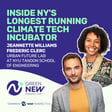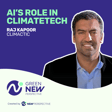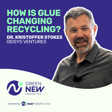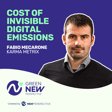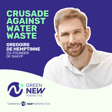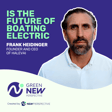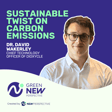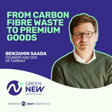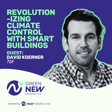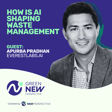
The Role of AI and Data in Sustainable Construction
As our world shifts toward a greener future, the construction industry finds itself at a critical juncture. Exploring the essence of sustainable construction becomes imperative as we strive to pave the way for an eco-friendly era in the building trades.
That's why we've sat down with Ryan Buckley, the CEO and co-founder of Shovels, a company employing data and AI to bridge the gap between homeowners and cleantech companies. Shovels dives into analyzing a whopping 100M building permits, facilitating climate tech companies in strategically targeting homeowners and building robust installer networks.
🕑 KEY MOMENTS
==================
➜ [00:04] We are now number 2 cleantech podcast by listens
➜ [01:53] Fnding good contractors and how Shovels AI is solving this problem by mining data from building permits
➜ [07:09] Ryan explains how Shovels AI provides data to climate tech companies so they can identify homeowners to target and find contractors to partner with
➜ [08:26]Trends in building electrification and how data helps climate companies market to the right homeowners
➜ [22:45] Ryan shares advice for clean tech startups on getting up to speed in the industry
📚 RESOURCES & LINKS
========================
- Shovels Website: https://www.shovels.ai/
- Shovels LinkedIn: https://www.linkedin.com/company/shovels/
- Ryan’s blog: https://rbucks.com
Climate Communities:
- https://mcjcollective.com
- https://workonclimate.org
👉 Interview with Ryan Buckley: https://npws.net/podcast/ai-sustainable-construction
🌍 SUSTAINABILITY PODCAST CREATED BY NEW PERSPECTIVE
========================
This podcast is proudly sponsored by New Perspective Marketing, a dynamic growth marketing agency in Boston, MA, celebrating 20 years in business. We help sustainably focused B2B organizations grow their brands and scale up revenue. If you or your organization is looking to grow, visit npws.com for more info.
🎧 SUBSCRIBE TO OUR PODCAST
===========================
- Spotify: https://bit.ly/3PSWIyI
- Apple Podcasts: https://bit.ly/3RvlHte
- Youtube: https://bit.ly/3RDzkXg
- Google Podcasts: http://bit.ly/465gjS5
- Deezer: https://bit.ly/3PvQaof
- Amazon Music: https://bit.ly/3PQlijS
- Zencastr: https://bit.ly/48xt75s
💬 FOLLOW US ON SOCIAL MEDIA
============================
- Instagram: https://www.instagram.com/greennewperspective/
- Twitter: https://twitter.com/gnperspective
- Facebook: https://www.facebook.com/greennewperspective
- LinkedIn: https://www.linkedin.com/showcase/greennewperspective/
- TikTok: https://www.tiktok.com/@greennewperspective
#ai #cleantech #datascience #machinelearning #artificialintelligence

